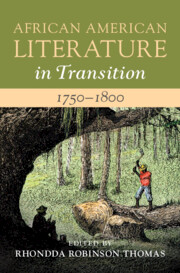Book contents
- African American Literature in Transition, 1750–1800
- African American Literature in Transition
- African American Literature in Transition, 1750–1800
- Copyright page
- Contents
- Contributors
- Preface
- Chronology
- Introduction
- Part I Limits and Liberties of Early Black Print Culture
- Part II Black Writing and Revolution
- Part III Early African American Life in Literature
- Chapter 7 Reading and Building a Nation; or, Everyday Living (while Black) in Early America
- Chapter 8 Respectability Politics and Early African American Literature
- Chapter 9 Early Black Futures
- Part IV Evolutions of Early Black Literature
- Index
Chapter 7 - Reading and Building a Nation; or, Everyday Living (while Black) in Early America
from Part III - Early African American Life in Literature
Published online by Cambridge University Press: 01 April 2022
- African American Literature in Transition, 1750–1800
- African American Literature in Transition
- African American Literature in Transition, 1750–1800
- Copyright page
- Contents
- Contributors
- Preface
- Chronology
- Introduction
- Part I Limits and Liberties of Early Black Print Culture
- Part II Black Writing and Revolution
- Part III Early African American Life in Literature
- Chapter 7 Reading and Building a Nation; or, Everyday Living (while Black) in Early America
- Chapter 8 Respectability Politics and Early African American Literature
- Chapter 9 Early Black Futures
- Part IV Evolutions of Early Black Literature
- Index
Summary
This chapter examines a lesser-known subscription listing in Rev. Samuel Hopkins’s System of Doctrines (1793). It is a list of seventeen free Black women and men from Rhode Island; they are five women and twelve men who have paid to purchase or to support the publication of Hopkins’s treatise on systematic theology. It is their living – as it is presented in this listing – that asks us to read closely for their story and in a way that, as literary scholar Lois Brown asserts, is “nuanced and meditative.” The “Free Blacks” gather in a published list that not only publicizes the purchasing power of those named and their intention to read, but also, and most importantly, publicizes their desire to make a place for themselves on their own terms and outside the limits of Rhode Island.
- Type
- Chapter
- Information
- African American Literature in Transition, 1750–1800 , pp. 181 - 203Publisher: Cambridge University PressPrint publication year: 2022

